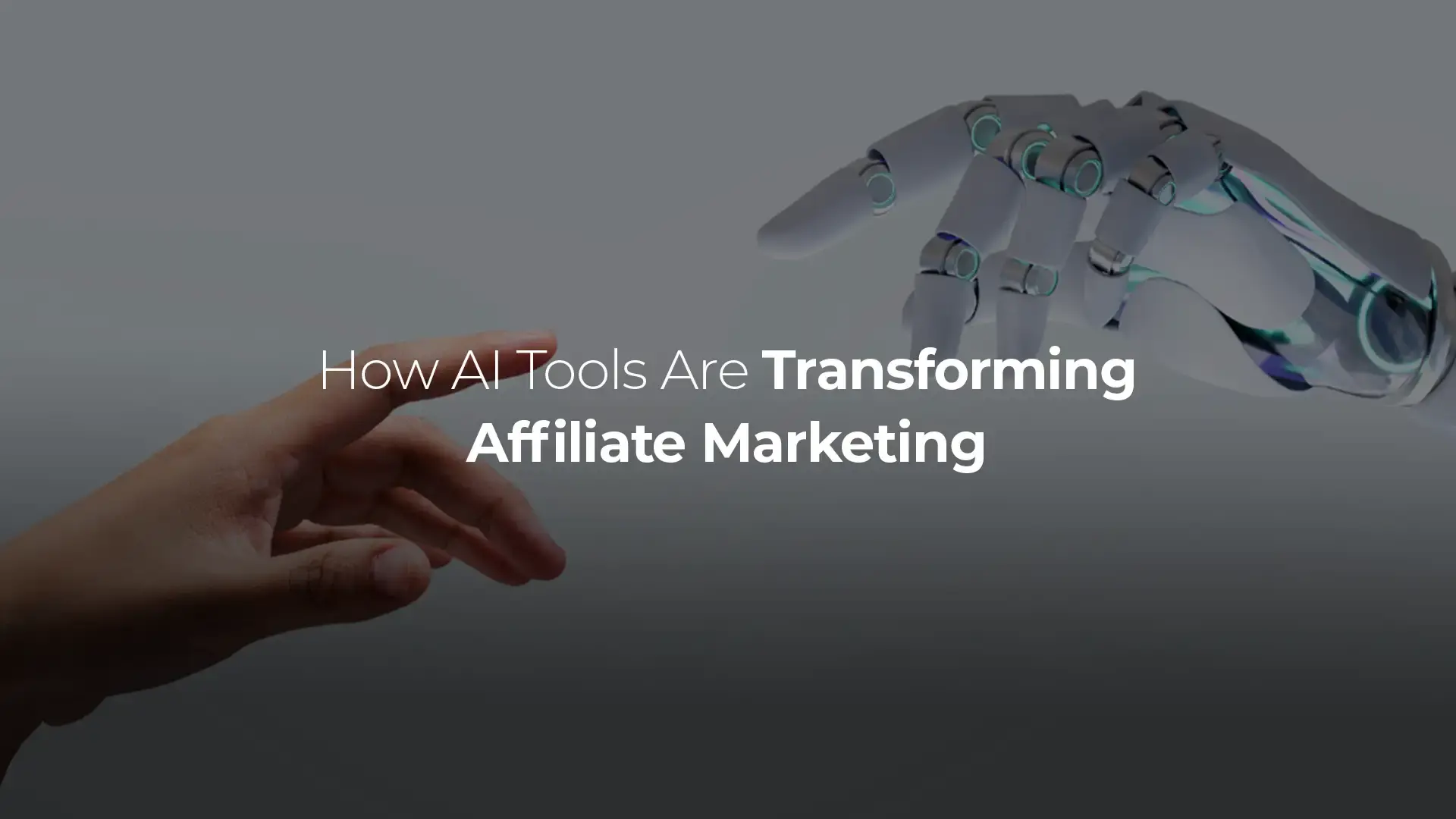
How AI Tools Are Transforming Affiliate Marketing
Artificial intelligence is transforming affiliate marketing by altering the ways consumers find products and how campaigns are refined. More and more, consumers depend on AI-driven assistants. For instance, AI chatbots now handle over half of common inquiries on their own, lessening the need for traditional review platforms and Q&A, indicating a shift in the user experience.
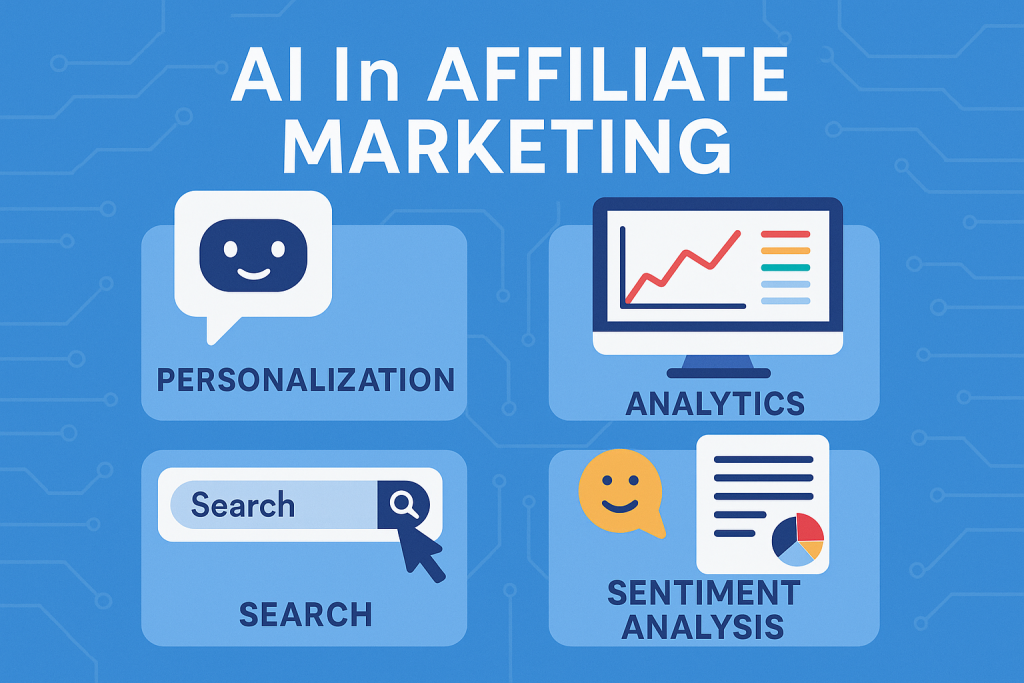
Concurrently, affiliates are leveraging AI to convert vast amounts of data into clear strategies and customize every interaction. PaveAI’s analytics reports, for example, “transform data into actionable insights, using AI to examine traffic and conversion trends” so marketers can prioritize the most effective methods. NLP tools, such as MonkeyLearn, analyze text from reviews and social media to assess customer opinions and preferences. This blend of consumer-facing and marketer-focused AI is bringing significant changes: affiliates must evolve or risk being left behind in a landscape increasingly dominated by AI.
AI and the Consumer Journey
AI is significantly transforming how decisions are made and how digital user journeys unfold. Today’s consumers are looking for experiences that are highly personalized. Study indicates that approximately 71% of consumers now expect customized interactions, and AI enables this on a large scale. Sophisticated analytics can connect various behaviors across different channels: for instance, AI tools can merge scattered data from mobile applications, social platforms, and email to create a comprehensive view of the customer journey.
Affiliates can accurately identify which touchpoints led to a purchase, rather than relying on incomplete indications. AI also responds in real-time to user intentions. Conversational interfaces, such as chatbots and voice assistants, provide instant answers to inquiries or product recommendations.
For example, Sephora’s AI-driven chatbot not only recommends products but also tailors suggestions based on a quick quiz, enhancing the shopping experience and increasing conversions by as much as 11%. In summary, AI-fueled personalization and immediate interaction facilitate a seamless transition for consumers from awareness to purchase, and affiliates should leverage these insights to align their content and offerings with genuine user behavior.
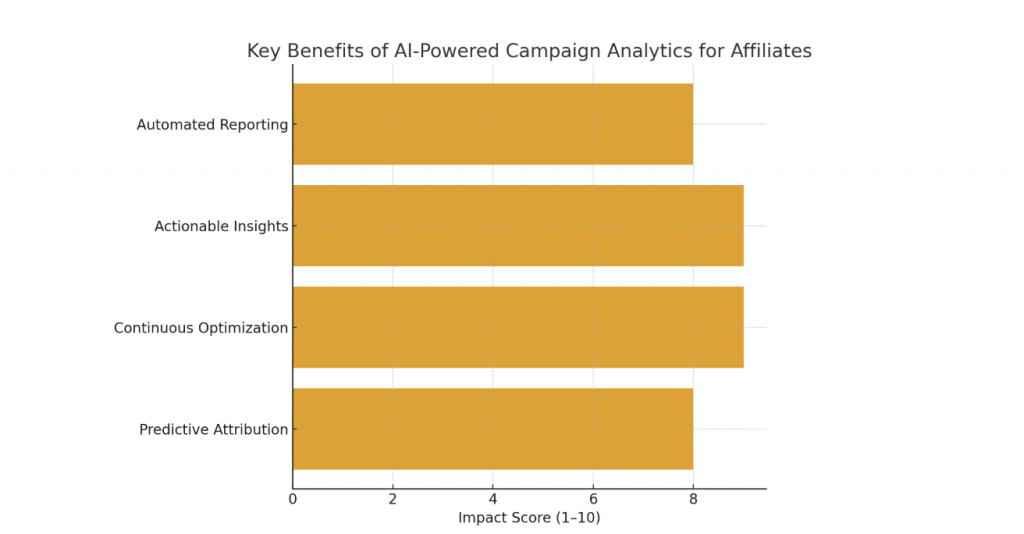
Key ways AI shapes consumer behavior:
–Hyper-Personalization: AI examines individual browsing patterns, demographics, and context to provide customized product recommendations and content. With 71% of consumers anticipating personalized experiences, affiliates are now employing AI-driven segmentation along with email and content personalization to fulfill this expectation.
-Predictive Recommendations: Machine learning algorithms predict what actions a user is likely to take next. For instance, affiliates can leverage predictive analytics to determine when a user may abandon a sales funnel and initiate a targeted offer.
-Unified Cross-Channel View: AI aggregators compile data from multiple devices so that affiliates can visualize the entire user journey, such as connecting a user’s social media click, mobile app visit, and email interaction into a single pathway, clarifying which channels effectively lead to conversions.
-Conversational Interaction: Chatbots and voice AIs (like Alexa or Google Assistant) enable users to ask questions in natural language. Brands are implementing on-site chatbots to deliver immediate assistance and product recommendations, keeping users engaged.
This change in user behavior is backed by recent statistics. A study by McKinsey reveals that 67% of consumers regard AI-generated recommendations with the same trust as those made by humans, emphasizing the importance of AI in the decision-making process. As AI continues to adapt to user preferences over time, affiliates who take advantage of these insights, for example, by spotlighting features deemed significant by AI trend analysis, can craft more appealing, user-focused campaigns.
ChatGPT and Modern Search Behavior
Generative AI technologies are transforming the ways search and discovery occur. The “Search” function of ChatGPT has experienced tremendous growth, attracting over 556 million unique visitors within its initial year. Users typically enter very brief, conversational questions, averaging around 4.2 words each when chat search is enabled, compared to 23 words otherwise, while often anticipating an instant response. In fact, a substantial 70% of queries made via ChatGPT are so distinctive that they cannot be classified into traditional categories such as informational, navigational, or transactional, indicating that users utilize ChatGPT for innovative solutions rather than simple queries. This shift has significant consequences for affiliates: rather than redirecting to product pages or reviews, ChatGPT is likely to offer amalgamated answers or suggestions, which could lead to affiliates being overlooked entirely.
The affiliate marketing arena is influenced by various AI elements, machine learning, predictive analytics, and even computer vision. Machine learning algorithms assist in optimizing bidding strategies and identifying trends in extensive datasets; NLP facilitates chatbot functionality and the analysis of text sentiment; predictive analytics anticipates future developments; and computer vision can evaluate images or video advertisements. Collectively, these technologies empower more intelligent and automated tactics. For instance, machine learning enables affiliates to analyze thousands of clicks and conversions to identify their best-performing partners.
At the same time, natural language processing enhances features such as automated content creation, semantic SEO, and on-site chat interactions. As per one study, leveraging AI enables affiliates to expand their operations and “enhance content quality and SEO outcomes” by refining headlines and descriptions with applicable keywords. In summary, affiliates are uniting these AI technologies to personalize their outreach, experiment with different creative approaches, and improve targeting more effectively than ever.
Impacts of ChatGPT on Search and Content:
Immediate Answers vs. Click-Through Rates: AI chatbots frequently deliver responses directly within their interfaces. According to Symphonic Digital, AI-generated replies now manage more than half of standard factual and coding inquiries, which means users might not frequently navigate to affiliate review sites or blogs. Numerous established platforms (like Wikipedia, Quora, and Yelp) have experienced declines in traffic as AI supplies instant responses. Consequently, affiliates must work to ensure that their content is referenced in AI replies by adhering to optimal practices (such as producing high-quality, authoritative material with FAQ schema) to increase the chances of being cited by the AI.
Shifts in Content Discovery: Users are now treating ChatGPT and Bing Chat as research tools. Affiliates leverage prompts to brainstorm topics, evaluate trends, or generate copy. For instance, marketers might request that ChatGPT “assess the online behavior and preferences of my target audience” to uncover pain points and emerging trends. This indicates that affiliates frequently develop content influenced by insights produced by AI. However, since chat interfaces favor brief, engaging answers, traditional long-form content may need to be reorganized into smaller, conversational segments to succeed.
Adapting for AI Search: As search technology advances, experts advise modifying SEO strategies. For example, content organization should incorporate schema markup and conversational Q&A structures to facilitate easier parsing and visibility by AI systems. Additionally, affiliates are investing in AI SEO, a strategy that leverages AI to produce data-informed content and optimize for AI-generated overviews. The swift rise of ChatGPT search represents a “remarkable change” in search behavior, and those who act quickly to optimize for it (such as targeting innovative or long-tail queries that AI users seek) could potentially secure an advantage.
AI-Powered Campaign Analytics (PaveAI and Beyond)
In the realm of campaign optimization, artificial intelligence is transforming basic analytics into effective strategies. Affiliates encounter vast amounts of performance data, including traffic, conversions, and partner statistics, and tools like PaveAI streamline the analytical process. PaveAI links with Google Analytics to “convert your Google Analytics data into easy-to-understand insights.” It assesses the sources of affiliate traffic and evaluates the performance of each channel, subsequently producing reports that indicate to marketers what strategies are succeeding.
According to a blog dedicated to the affiliate industry, PaveAI “utilizes AI to scrutinize traffic and conversion trends, determining which strategies are effective and which are not.” Consequently, affiliates are freed from laboriously reviewing countless spreadsheets; they receive straightforward recommendations, often including suggested actions like “increase focus on mobile social ads” or “refine the copy on this landing page.”
Employing PaveAI along with similar tools equips marketers to swiftly enhance targeting and budget allocations. For instance, if PaveAI highlights a decline at a certain phase of the campaign, affiliates can promptly conduct A/B testing on that landing page or adjust the campaign framework without hesitation. Other analytics platforms powered by AI, such as FunnelEnvy and Optimizely, complement this by automating the process of personalization and testing. These tools carry out multivariate experiments across varying headlines, images, and calls-to-action, with machine learning determining the most effective combinations. In essence, AI-driven analytics transforms data into actionable decisions, enabling affiliates to respond to trends in real-time and make live adjustments to campaigns.
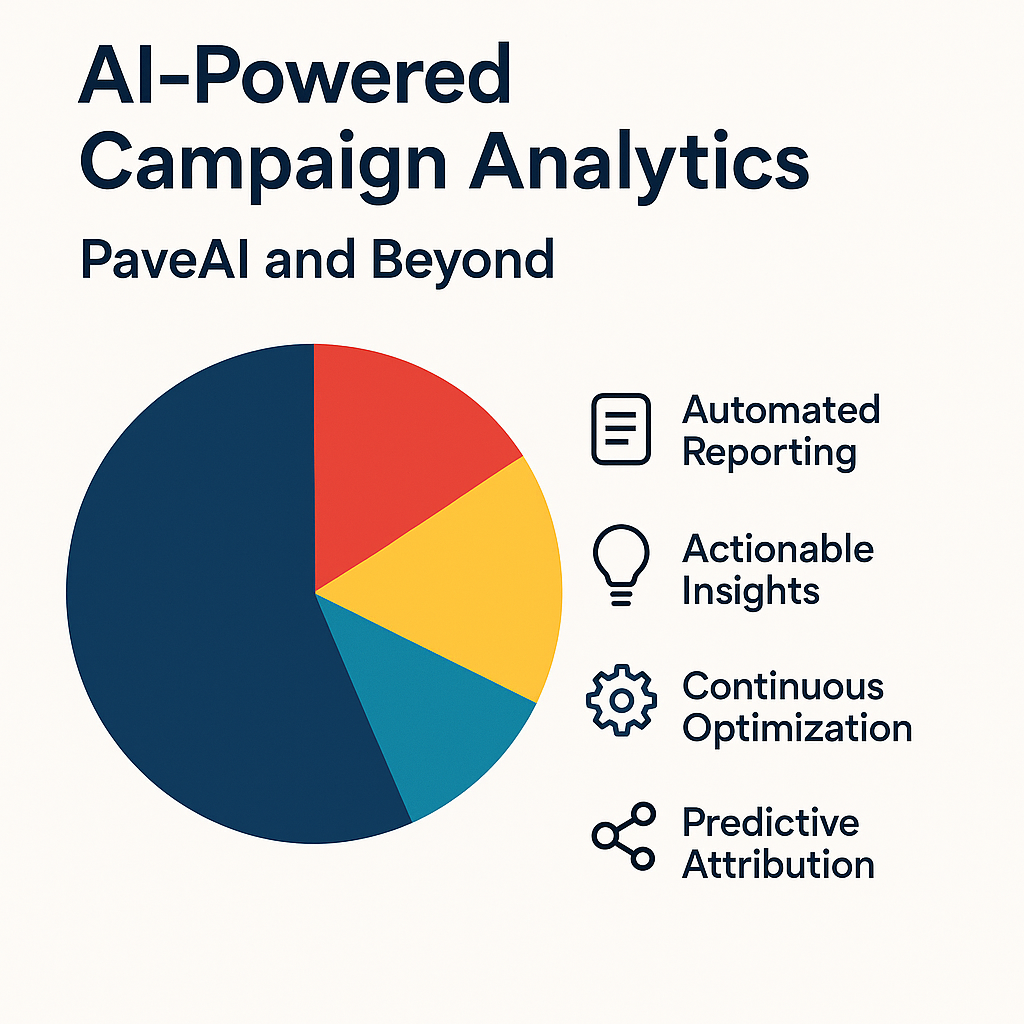
Advantages of AI Analytics for Affiliates:
Automated Reporting: PaveAI autonomously creates easily interpretable reports from Google Analytics data, emphasizing critical metrics (such as conversion rates and leading referrers) without necessitating manual review.
Actionable Insights: By accurately identifying the most lucrative affiliate channels and campaigns, AI-generated reports assist marketers in reallocating their budget efficiently (for example, shifting resources to top-performing partners).
Continuous Optimization: AI-driven testing tools like Optimizely and FunnelEnvy leverage machine learning to enhance creative components and processes. This allows affiliates to consistently improve landing pages and advertisements, discovering, for instance, that “minor adjustments in button colors can increase click-through rates by 20%” due to AI-enabled A/B testing.
Predictive Attribution: Going further than mere reporting, AI has the capacity to model multi-touch attribution. Machine learning evaluates the contribution of each touchpoint in relation to a sale, empowering affiliates to accurately assign credit to email, search ads, or social media posts. This ensures that commission distributions and budget allocations reflect genuine performance rather than the misleading last-click approach.
NLP and Sentiment Analysis (MonkeyLearn and Friends)
Grasping customer feedback is equally crucial as understanding their actions. Platforms for NLP, such as MonkeyLearn, enable affiliates to analyze vast amounts of text data efficiently. MonkeyLearn offers ready-made models for sentiment analysis, keyword extraction, topic classification, and other functionalities.
Affiliates utilize these resources to delve into user-generated content; for instance, by inputting thousands of product reviews, survey feedback, or social media interactions. The AI subsequently categorizes each text according to sentiments or topics. As highlighted by PollThePeople, sentiment analysis tools like MonkeyLearn can “assess audience preferences and emotional reactions towards products or content.” This process reveals critical insights – for example, if 80% of reviews highlight “easy to use” positively, an affiliate can emphasize ease-of-use in advertisements and landing pages. On the flip side, if numerous comments cite a concern (such as “slow shipping”), affiliates can tackle that in FAQ sections or modify their offers (like promoting faster shipping alternatives).
By quantifying user sentiment and themes, NLP aids in enhancing creatives and copy. Affiliates may tailor promotions according to sentiment categories – for instance, directing ads about product durability solely to those users who have raised concerns regarding build quality. These text analytics tools serve as the affiliate’s “ears to the ground,” consistently monitoring customer feedback. In one example, an affiliate might run MonkeyLearn on recent evaluations and identify an emerging negative trend regarding pricing. Consequently, the affiliate could quickly test new messaging (perhaps by focusing on discounts or value) on the landing page. In summary, MonkeyLearn and comparable NLP services ensure that creative choices are based on genuine user sentiments.
NLP Applications for Affiliates:
Sentiment Tracking: Categorize customer reviews and social media remarks as positive or negative to monitor brand perception.
Trend Detection: Identify commonly mentioned topics (keywords, issues) from open-ended survey responses.
Content Enhancement: Utilize extracted keywords and sentiment indicators to improve ad copy, blog posts, and FAQ sections so they resonate with user language and emotions.
Evolving Affiliate Strategies and Risks
The emergence of AI presents both fresh possibilities and challenges for affiliates. On the positive side, AI tools allow for unparalleled levels of personalization, automation, and scalability. Affiliates that leverage these tools can operate more intelligently and engage users more efficiently. A recent guide highlights that AI tools enable affiliates to concentrate on crucial aspects (relationships and strategy) by handling repetitive tasks and generating valuable insights. Nevertheless, affiliates need to adapt their approaches to the evolving landscape:
Emphasize Quality over Quantity: Affiliates should avoid depending solely on mass-produced AI content. In fact, industry professionals caution that “AI content may achieve temporary rankings, but this isn’t a sustainable strategy.” Algorithms and affiliate managers are becoming more astute: some brands prohibit AI-generated content within their programs. The focus should instead be on providing unique value – expert opinions, personal anecdotes, and comprehensive comparisons – that AI alone cannot easily produce.
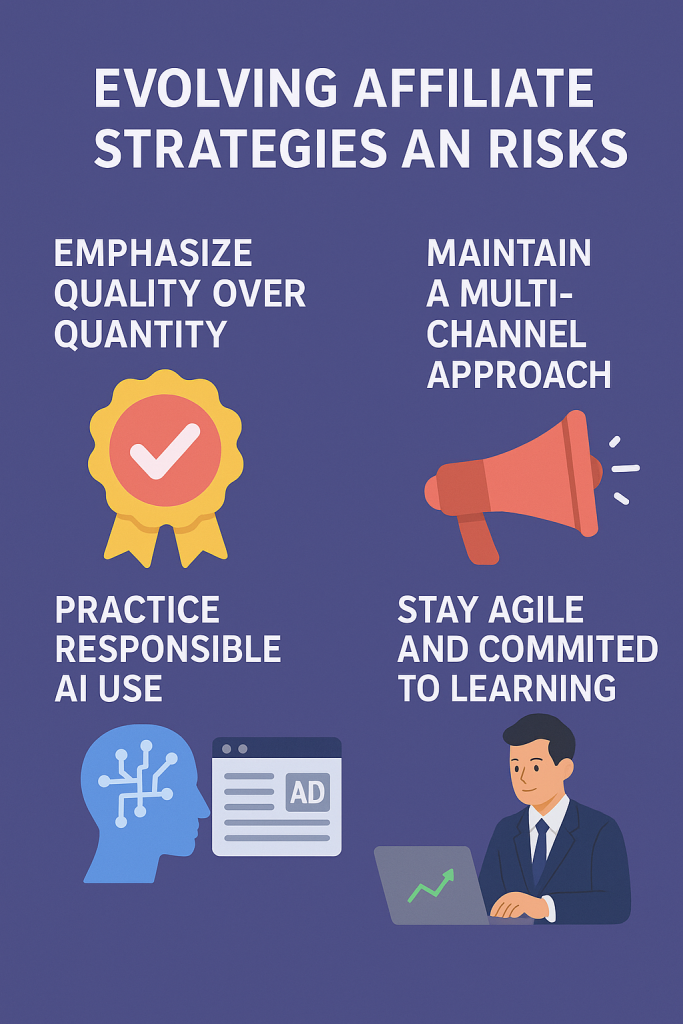
Maintain a Multi-Channel Approach: As AI increasingly influences search, affiliates ought to broaden their horizons. Symphonic Digital suggests enhancing other channels such as email, social media, and community interactions. For instance, cultivating a loyal subscriber base or collaborating with influencers can generate direct traffic that AI-driven chat will not intercept. Affiliates can also explore new formats (video, interactive content, voice search) that capitalize on AI’s strengths or address its shortcomings.
Practice Responsible AI Use: Automation needs to be coupled with oversight. Affiliates should verify the accuracy of AI-generated content and ensure compliance with disclosure regulations (advertising rules still apply). Automatically approving content “just because it passed an AI scan is risky,” as AI might fail to catch inaccuracies or missing disclosures. Human review and clear affiliate disclosures are vital.
Stay Agile and Committed to Learning: The AI landscape evolves swiftly. Affiliates need to consistently test and adapt. AI-powered A/B testing, for example, aids in refining creatives instantaneously. As one marketer remarked, utilizing tools like Optimizely alongside machine learning can reveal “unexpected winning combinations” by assessing numerous variables simultaneously. Affiliates also need to stay updated with AI developments (e.g., ChatGPT shopping features, new SEO strategies) to prevent being caught off guard.
Despite these challenges, the affiliate channel is not on the verge of extinction. As one SEO analyst states, affiliate marketing “is more than just a content website” and is likely to expand by capitalizing on AI rather than being eliminated by it. By utilizing AI tools such as ChatGPT for intelligent content creation, PaveAI for analytics, and MonkeyLearn for sentiment analysis, affiliates can enhance their efficiency and effectiveness. The essential element is to merge technology with human creativity and discernment. In the end, AI-enhanced personalization, profound data insights, and flexible content will distinguish the most successful affiliate campaigns in 2025 and onwards.
Essential Recommendations for Affiliates:
Adopt AI tools (large language models, analytics platforms, natural language processing) to streamline research, content creation, and data examination, but always incorporate human oversight.
Optimize for the AI-centric landscape: implement structured data and establish authoritativeness to be considered in AI outputs, and design content for conversational formats.
Broaden communication channels beyond organic search (for instance, email, social media, public relations) to engage audiences wherever they are active.
Continuously test and refine using AI-powered tools to enhance creatives and offers, transforming AI insights into actionable optimizations.
As AI continues to develop, affiliates who revise their strategies and make use of these intelligent systems will secure a competitive advantage. In the transformed affiliate ecosystem, those who blend the capabilities of AI with genuine, user-centered approaches will thrive.
